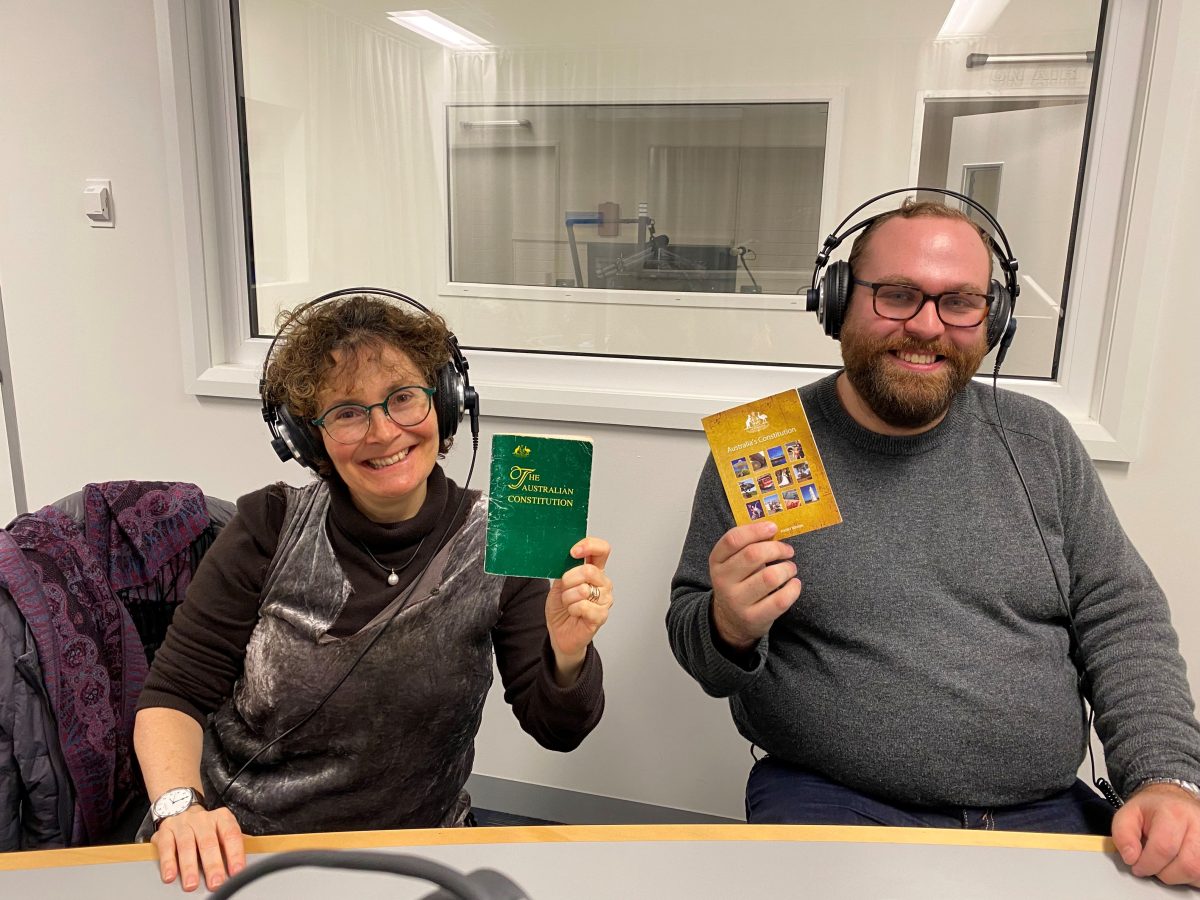
Canberra academics Professor Kim Rubenstein and James Blackwell are co-hosts of the new podcast series It’s Not Just the Vibe, It’s the Constitution. Photo: Supplied.
”It’s the vibe of it. It’s the Constitution. It’s Mabo. It’s justice. It’s law. It’s the vibe and ah, no that’s it. It’s the vibe. I rest my case.”
It’s one of the most quoted lines from the cult classic Australian film The Castle, originally spoken by bumbling small-time lawyer Dennis Denuto.
More than 25 years after the film’s release, two Canberra academics are tackling the underlying sentiment behind the famed quote in their new podcast series It’s Not Just the Vibe, It’s the Constitution.
“Most people would perhaps appreciate that there are fundamental rules that underpin the way our system of government works,” podcast co-host Professor Kim Rubenstein says.
“But they really should have a better understanding of the actual Constitution, more than the vibe, because its impact really is significant on all of our lives.”
The University of Canberra professor in constitutional law and one-time political candidate says the podcast came from a desire to share this understanding with people outside her classes.
She’s joined forces with Australian National University research fellow in Indigenous diplomacy, PhD candidate and Wiradjuri man James Blackwell to make this desire a reality.
While the timing of It’s Not Just the Vibe, It’s the Constitution was sparked by the upcoming Voice to Parliament referendum, only the last episode focuses exclusively on that.
The first seven episodes focus on different aspects of the Constitution, such as the separation of powers and citizenship, with Indigenous and other real-world issues weaved throughout.
Professor Rubenstein says all of the podcast topics transcend party politics and go to the relationship between individuals and the state, including the topic of the Voice referendum.
“It’s political in the sense of the discipline of politics and being able to think about how political structures impact on our lives, but it’s not political in a partisan sense,” she says.
“It really is a foundational citizenship, constitutional question about the fact that Indigenous Australians, when the Constitution was formed, were not included.
“In fact, they were specifically discriminated against and the structures were set up to be able to continue to discriminate against Indigenous Australians.
“So if we’re really, truly truthful about reconciliation, where better to start than in that foundational document that governs all of our lives?”
While both Professor Rubenstein and Mr Blackwell openly support the Voice, they say the objective of the podcast series is to inform, rather than to persuade, people.
“To paraphrase Aunty Pat Anderson, this is the most important vote most Australians will ever take in their entire lives and I wholeheartedly agree with that,” Mr Blackwell says.
“If we’re going to have that really important vote, it’s even more important, given mandatory voting and how we all are forced to make a decision here, that we’re informed on that [vote].
“Obviously, I hope they vote yes, we aren’t doing this to get folks to vote no. But even if folks do come out of this voting no, I hope at least they are better equipped for what they’re voting no for.”
Mr Blackwell, who lives near Young, says it was also important to connect with people outside the “Canberra bubble” and record the last two podcast episodes on Wiradjuri country.
“We talk about the story of Uncle John Noble and Uncle Jimmy Clements, two Wiradjuri men who journeyed to Canberra in 1927 to be present at the first opening of parliament,” he says.
“I think the importance of that is showing Indigenous people, and in particular Wiradjuri people, advocating for our voices in Canberra has a very long history. It’s not something new.
“As we sit here in 2023, nearly 100 years since Uncle Jimmy and Uncle John were in Canberra, we’re still having these discussions and fights for voice, recognition and consultation.”












